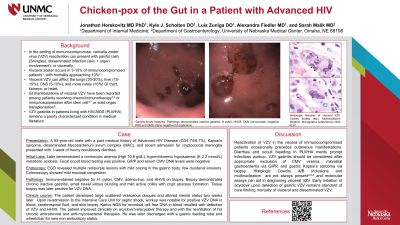Monday Poster Session
Category: Stomach
P3371 - Chicken Pox of the Gut in a Patient With Advanced HIV
Monday, October 28, 2024
10:30 AM - 4:00 PM ET
Location: Exhibit Hall E

Has Audio

Jonathan Herskovitz, MD, PhD
University of Nebraska Medical Center
Omaha, NE
Presenting Author(s)
Jonathan Herskovitz, MD, PhD, Kyle Scholten, DO, Luis Zuniga, DO, Alexandra Fiedler, MD, Sarah Malik, MD
University of Nebraska Medical Center, Omaha, NE
Introduction: Gastrointestinal (GI) involvement of varicella zoster virus (VZV) is a rare initial manifestation of disseminated viremia in immunocompromised patients. VZV gastritis occurs in 3-15% of immunocompromised patients through reactivation of latent virus in the enteric nervous system, with mortality approaching 40%. Nearly all reported cases appear in the setting of hematologic malignancy or post-transplant immunosuppression. Ulcerative-necrotic enteric lesions with secondary hemorrhage due to VZV predominantly appear in the upper GI tract. VZV hemorrhagic gastritis in patients living with HIV/AIDS (PLWHA) remains a poorly characterized condition in medical literature.
Case Description/Methods: A 55-year-old male with a past medical history of Advanced HIV Disease (CD4 74/6.7%), Kaposi’s sarcoma, disseminated Mycobacterium avium complex (MAC), and recent admission for cryptococcal meningitis presented with 1-week of hourly non-bloody diarrhea. Fecal occult blood testing for mild anemia resulted positive. GI pathogen panel and serum CMV DNA levels were negative. The patient underwent diagnostic esophagogastroduodenoscopy (EGD) and colonoscopy, which revealed multiple red/purple lesions in the gastric body that immune-stained negative for H. pylori, CMV, adenovirus and HHV8 on biopsy. The patient developed large scattered violaceous plaques and altered mental status two weeks later. Further evaluation upon re-admission to the Intensive Care Unit for septic shock was notable for positive VZV DNA in blood, cerebrospinal fluid, and skin biopsy. The patient improved clinically on acyclovir / valacyclovir therapy as well as re-initiation of his chronic antiretroviral and anti-mycobacterial therapies. He was later discharged with a gastric feeding tube and wheelchair for new non-ambulatory status.
Discussion: Diarrhea and occult bleeding in PLWHA merits prompt infectious workup. VZV gastritis should be considered after appropriate exclusion of CMV viremia, microbial gastroenteritis via GIPP, and gastric Kaposi’s sarcoma via biopsy. Histologic hallmarks of multinucleation and Cowdry A/B inclusions should warrant further immunohistochemistry and serologic testing. Early initiation of acyclovir upon detection of gastric VZV remains standard of care to prevent sequelae of disseminated VZV.

Disclosures:
Jonathan Herskovitz, MD, PhD, Kyle Scholten, DO, Luis Zuniga, DO, Alexandra Fiedler, MD, Sarah Malik, MD. P3371 - Chicken Pox of the Gut in a Patient With Advanced HIV, ACG 2024 Annual Scientific Meeting Abstracts. Philadelphia, PA: American College of Gastroenterology.
University of Nebraska Medical Center, Omaha, NE
Introduction: Gastrointestinal (GI) involvement of varicella zoster virus (VZV) is a rare initial manifestation of disseminated viremia in immunocompromised patients. VZV gastritis occurs in 3-15% of immunocompromised patients through reactivation of latent virus in the enteric nervous system, with mortality approaching 40%. Nearly all reported cases appear in the setting of hematologic malignancy or post-transplant immunosuppression. Ulcerative-necrotic enteric lesions with secondary hemorrhage due to VZV predominantly appear in the upper GI tract. VZV hemorrhagic gastritis in patients living with HIV/AIDS (PLWHA) remains a poorly characterized condition in medical literature.
Case Description/Methods: A 55-year-old male with a past medical history of Advanced HIV Disease (CD4 74/6.7%), Kaposi’s sarcoma, disseminated Mycobacterium avium complex (MAC), and recent admission for cryptococcal meningitis presented with 1-week of hourly non-bloody diarrhea. Fecal occult blood testing for mild anemia resulted positive. GI pathogen panel and serum CMV DNA levels were negative. The patient underwent diagnostic esophagogastroduodenoscopy (EGD) and colonoscopy, which revealed multiple red/purple lesions in the gastric body that immune-stained negative for H. pylori, CMV, adenovirus and HHV8 on biopsy. The patient developed large scattered violaceous plaques and altered mental status two weeks later. Further evaluation upon re-admission to the Intensive Care Unit for septic shock was notable for positive VZV DNA in blood, cerebrospinal fluid, and skin biopsy. The patient improved clinically on acyclovir / valacyclovir therapy as well as re-initiation of his chronic antiretroviral and anti-mycobacterial therapies. He was later discharged with a gastric feeding tube and wheelchair for new non-ambulatory status.
Discussion: Diarrhea and occult bleeding in PLWHA merits prompt infectious workup. VZV gastritis should be considered after appropriate exclusion of CMV viremia, microbial gastroenteritis via GIPP, and gastric Kaposi’s sarcoma via biopsy. Histologic hallmarks of multinucleation and Cowdry A/B inclusions should warrant further immunohistochemistry and serologic testing. Early initiation of acyclovir upon detection of gastric VZV remains standard of care to prevent sequelae of disseminated VZV.

Figure: Multiple reddish/violaceous lesions scattered throughout the gastric body
Disclosures:
Jonathan Herskovitz indicated no relevant financial relationships.
Kyle Scholten indicated no relevant financial relationships.
Luis Zuniga indicated no relevant financial relationships.
Alexandra Fiedler indicated no relevant financial relationships.
Sarah Malik indicated no relevant financial relationships.
Jonathan Herskovitz, MD, PhD, Kyle Scholten, DO, Luis Zuniga, DO, Alexandra Fiedler, MD, Sarah Malik, MD. P3371 - Chicken Pox of the Gut in a Patient With Advanced HIV, ACG 2024 Annual Scientific Meeting Abstracts. Philadelphia, PA: American College of Gastroenterology.
